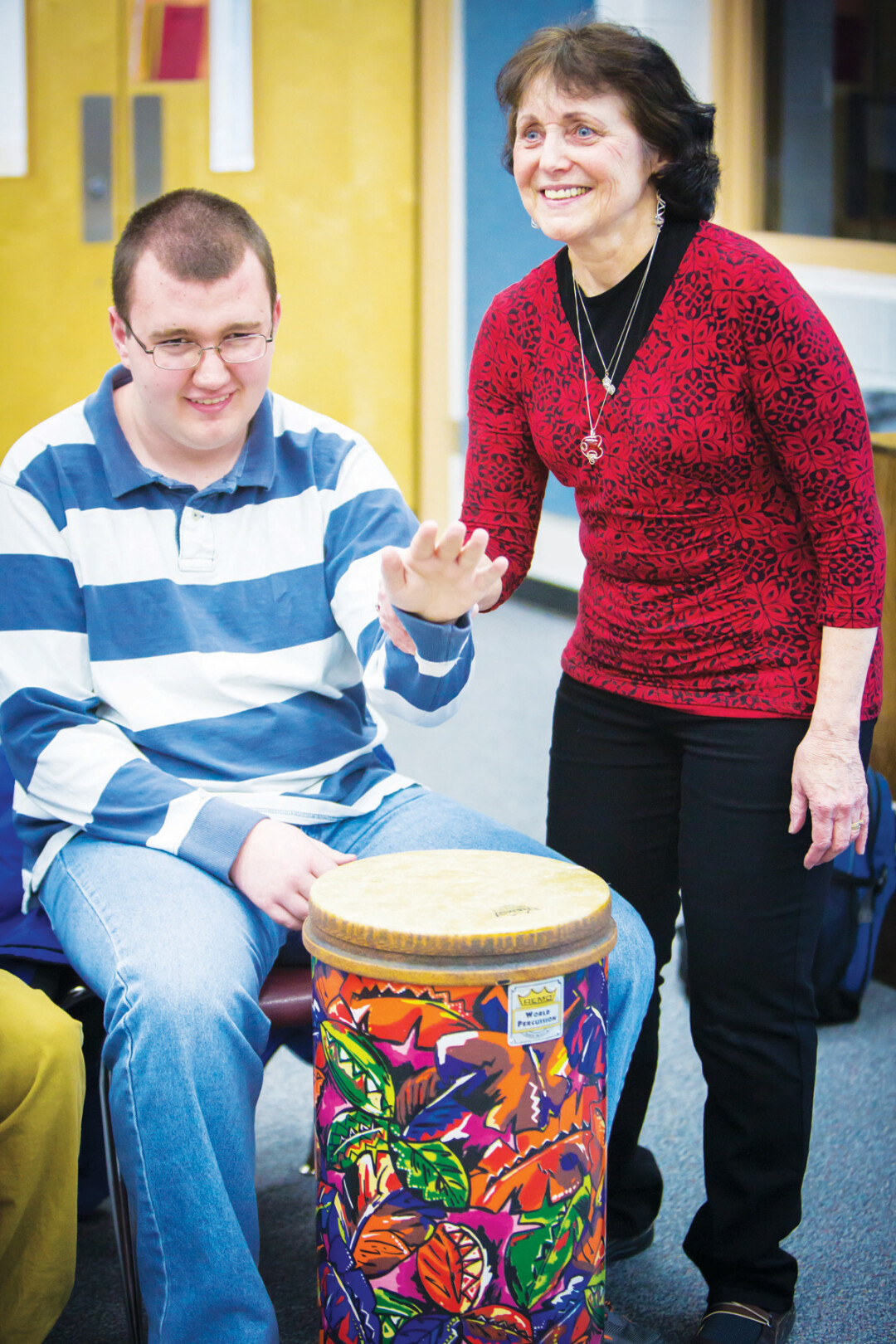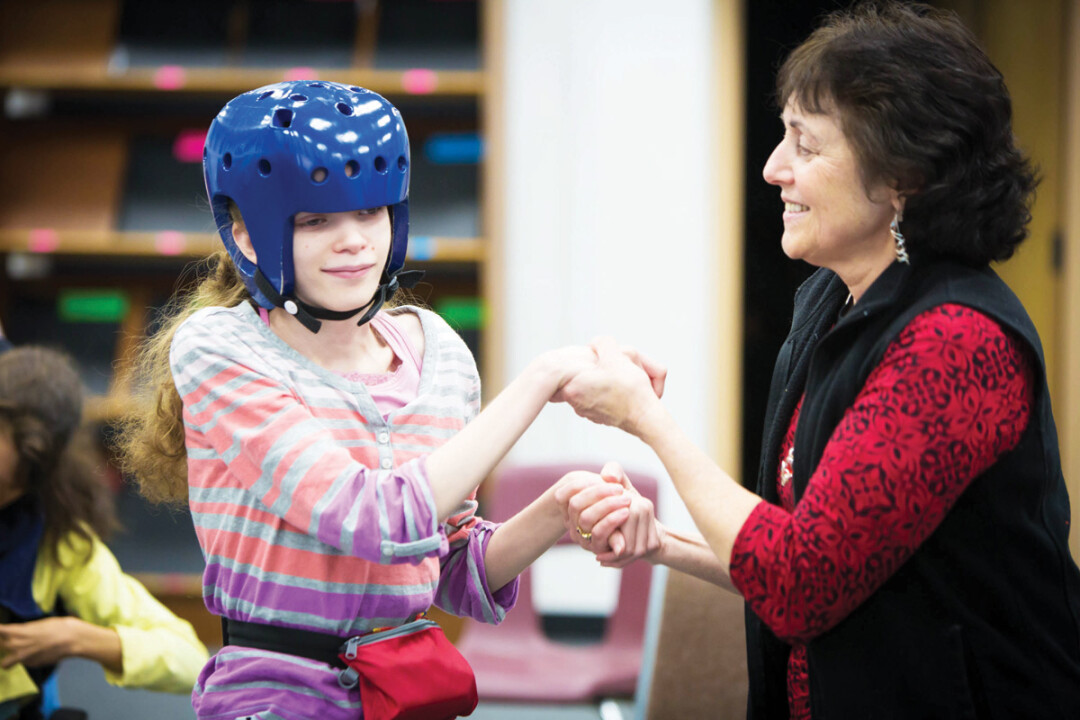Special Angels Soar With Adaptive Music
one teacher’s commitment makes all the difference to area students
photos by Kristen Cooley |

‘It’s all her,” Isaac Knopf, an adaptive music student at North High School and a performer in the Special Angels Show Choir, says as the teacher, Linda Johnson, hushes everyone. “She makes it all happen for us.”
“I wish everyone could see how hard our students work to achieve the musical excellence we push for in adaptive music.” – Linda Johnson, teacher, Special Angels Show Choir
The fifth-hour adaptive music class starts out with a solo performance by one of the students, and on this day it was Ryan Smith’s turn. With big arm movements and legs that never stopped moving, he danced his way through the song Can’t Stop the Beat, a hit from a 2015 Special Angels performance. “I like dancing,” Smith says as he takes his seat, not even the slightest bit out of breath after roughly five straight minutes of what can best be described as high intensity cardio. The following 40 minutes of the class are filled with colorful bells, choreographed dance practice for a number they plan to perform for the upcoming UCP telethon, African-style drumming, and a follow-the-leader-style dance game that includes breakdancing – and a notable amount of cheers and high fives. The entire room is busting at the seams from being filled with so much happy.
“I wish everyone could see how hard our students work to achieve the musical excellence we push for in adaptive music,” Johnson says. “I wish they could witness the positive attitudes, enthusiasm, excitement, talent, and willingness to try anything and everything.” And try they do. Even those in the fourth-hour class who have some bigger hurdles to overcome still manage to bop right along during wheelchair dancing and get excited about the hand-over-hand assistance they receive from staff and volunteers to create music.

Johnson started teaching adaptive music part-time in 2001 with the expectation that the program would be phased out before the next school year. “I went into this position not knowing anything about teaching students with disabilities,” Johnson says, “so I truly had on-the-job training.” They put on a small Christmas program to roughly 50 people that year. By 2004, the program was going so well that she had to secure an Adaptive Music License from UW-Eau Claire, and in 2007 the Special Angels Show Choir began traveling to other schools to perform. Come 2010 she was teaching full time between three schools (DeLong Middle School and Memorial and North high schools), and the following year they put on their biggest single show ever to roughly 1,500 people.
In 2012, Johnson received an Outstanding Achievement in Education Award at the Children’s Legacy Luncheon given by the Eau Claire Community Foundation for her work with special needs students. And in 2015, her class roster grew from 44 the previous year to 60 – spurring a need for volunteers and extra staff and prompting a move into the orchestra room at North to accommodate the extra people. Between January and May of last year, they performed eight times to a total of more than 5,000 people.
“Music challenges our students both physically and cognitively. I have been able to see such great progress through the years as they face the challenges of movement, rhythms, singing, and performing,” Johnson says. “Music touches our students in ways that academic classes cannot.” Johnson is able to relate many heartfelt stories about students that she’s seen progress through the adaptive music program. “Years ago I had a student with autism who did not speak or sing and needed hand-over-hand help with rhythm instruments. He smiled a lot when I would talk to him, but never answered. At the end of the year at a party we were having in our room someone turned on the karaoke machine and started singing a song we had been practicing,” she recalls. “We were all shocked to see it was our autistic student. He later became our main singer for the song ‘Y.M.C.A.’ at a Special Angels show.”

But while her students and their performances keep growing, Johnson says she sees another change happening as well. “Most people don’t see what we do in the classroom. They see our students walking in the halls and eating in the lunchroom. Sometimes they see behaviors that they don’t understand, and as a result they form opinions of our special needs population based on that,” she says. “However, the music programs have really opened the eyes of the general population of students, their families, and the public to the great talents that are hidden in this group of people. I can’t even begin to tell you (how many) people have told me that they have a new respect for our Special Angels when they see the incredible musical talents that emanate from a group of physically and mentally handicapped students who, on the outside, appear so challenged – yet surprise everyone with how much they can do!”


















